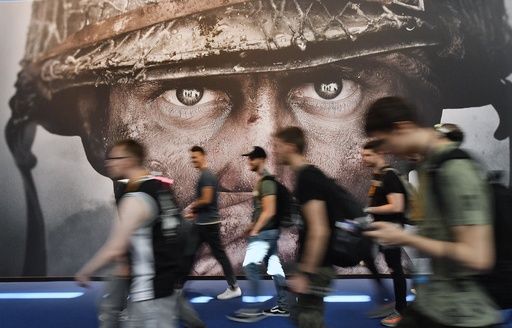Explainer: Is Microsoft still buying Activision Blizzard?
FILE – Visitors passing an advertisement for the video game ‘Call of Duty’ at the Gamescom fair for computer games in Cologne, Germany, Tuesday, Aug. 22, 2017. British regulators have blocked Microsoft’s $69 billion deal to buy videogame maker Activision Blizzard over worries that it would stifle competition in the cloud gaming market. (AP Photo/Martin Meissner, File)
It’s not “game over” yet for Microsoft’s quest to buy the video game maker Activision Blizzard, but the software giant is starting to run out of clear pathways to complete its $69 billion takeover.
A major setback came Wednesday when British antitrust regulators said they would block the acquisition. Microsoft and Activision have vowed to appeal, but the deal also faces legal challenges in other parts of the world.
It’s been more than 15 months since Microsoft, owner of the Xbox gaming system, first revealed its plans to buy the publisher of popular game franchises like Call of Duty, World of Warcraft and Candy Crush. But there’s no end in sight.
HOW MANY LIVES LEFT?
The deal awaits an important May decision from antitrust regulators representing the 27-nation European Union. It must also undergo an August trial in the U.S. before an administrative judge at the Federal Trade Commission. But a former FTC official says the U.K. decision could be a deal-breaker, especially if the appeals tribunal follows its “very deferential” approach to the regulator.
“If this were a smaller jurisdiction with a tiny population, the companies could shrug and say, ‘We just won’t do business there,’” said former FTC Chair William Kovacic. “They can’t do that very effectively with the United Kingdom. So a U.K. decision to block is basically a global decision to block the transaction.”
WHAT DOES IT MEAN FOR GAMERS?
Nothing for now. But even if Microsoft is able to complete the purchase, the average gamer is not going to notice immediate changes.
Harder to assess are the long-term effects on the games that get made and how people can play them, said Liam Deane, a game industry analyst at Omdia. That’s part of what antitrust enforcers around the world have spent the past year investigating.
Microsoft had promised to keep popular titles like Call of Duty on rival platforms like Sony’s PlayStation and Nintendo for at least a decade, but future Activision Blizzard games could be exclusive to Xbox.
“Down the line, it would have quite a big impact,” Deane said. “Activision is a big publisher, it has a big market share” and that could affect the “relative strength of the different console platforms.”
HAVE OTHER COUNTRIES APPROVED IT?
Yes, the deal won approval March 28 in Japan, a hub for game development and the home of both Sony and Nintendo. It’s also been approved in Brazil, South Africa and some smaller markets.
WHY DID U.K. BLOCK IT?
It was the small but growing cloud gaming market, not the existing console rivalry between Xbox and Sony, that the Competition and Markets Authority said it was concerned about.
Streaming games to tablets, phones and other devices has freed players from buying expensive consoles and gaming computers.
“What the CMA said, essentially, is that in cloud gaming Microsoft is the market leader,” Deane said. “And even though that is a smaller market, it’s one that’s at a critical stage where it’s just starting to take off and potentially that is going to become a huge platform in the future. And therefore it would be a risk to competition to strengthen Microsoft’s position in that market where they’re already leading.”
The watchdog said it reviewed Microsoft’s proposed remedies but found they would require its oversight, whereas preventing the merger would allow cloud gaming to develop without intervention.
—-
AP writer Kelvin Chan in London contributed to this report.
Copyright 2017 The Associated Press. All rights reserved.


